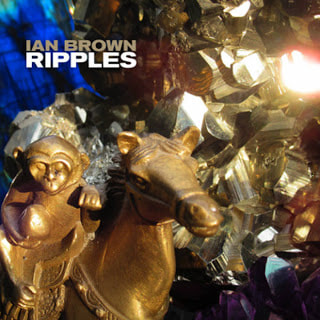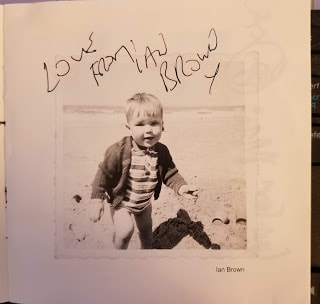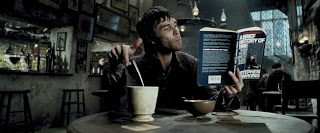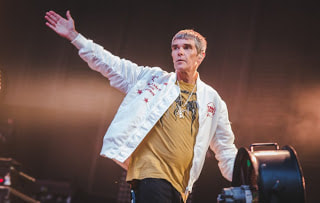|
An album review by Eric Sandberg Ian Brown is possessed of a natural gravitas of the sort Liam Gallagher desperately aspires to. Ian doesn't have Liam's snarl, but his once pot-ravaged voice has settled into a soft, pleasant timbre that carries a big stick. Where Liam writes lyrics that are painfully naive, Ian's words range from knowingly innocent to jaded omnipotence. Everything the former Stone Roses front man does is brimming with confidence and a quiet swagger. After conquering the world with their 1989 debut album, The Stone Roses fell into the 'we need to get out of this record contract and sign with a major label' trap, delaying their Geffen Records follow-up, the appropriately titled Second Coming, until 1994. By then, visionary, atmospheric producer John Leckie had moved on and Ian Brown's voice had been reduced to a rasp from smoking pot. I met three of the four members of Stone Roses [Guitarist John Squire was the no-show] at a sparsely attended record release party in a tiny restaurant on the Sunset Strip in December of that year. Mani and Reni, the Rose's world-beating rhythm section, were jovial and friendly while Ian did his best but seemed preoccupied. After the event, as I drove by the front of the restaurant, I saw Ian standing alone on the curb with his hands in his pockets, staring into the night's sky. "What am I going to do now?" I now imagine he was thinking. My Second Coming CD booklet signed by Ian Brown The sweepstakes for who would have the most successful post Stone Roses career seemed to favor guitarist/artist John Squire. Despite its failings Second Coming was a showcase for his fluid, lugubrious and sinewy guitar chops. But never count out sheer chutzpah and the willingness to start from scratch to reinvent yourself. Aided and abetted by endlessly imaginative knob twirler, Dave McCracken, it was Ian Brown who found a completely new musical direction. Salvaging his faded voice and emphasizing his lyrical wizardry, Brown and McCracken created a sea of colorful and varied soundscapes married with intriguing word play and themes. Brown's solo career took off — four straight Gold albums, "Best Solo Artist" and "Godlike Genius" awards from New Musical Express and Q Magazine's "Legend" award, along with the briefest, but coolest, cameo ever in a Harry Potter film. Confirming what we all knew: Ian could not possibly be a Muggle This run of ingenuity and continuous reinvention ran up to his fifth solo album, 2007's The World Is Yours, which paired his rap-savvy rhymes with powerful string arrangements, delivering enough Bond theme songs to lead off the next twelve movies. After a Greatest Hits package Brown released one more album My Way in 2009 which showed him, for the first time, seemingly unsure about his direction, as evidenced by his puzzling cover of Zager and Evans' "In the Year 2525." The next move improbably turned out to be a full-on Stone Roses reunion. The band played several headline gigs and festivals and released a new single "All For One." The song divided fans. John Squire's trademark guitar pyrotechnics were paired with arguably the most inane and simplistic lyric Brown ever wrote. A follow up single, released only on 12" vinyl sounded like an outtake from Second Coming. As the band attempted to record a new album, Brown was captured on video outside the studio proclaiming what was happening inside to be "glorious!" This proved to be disingenuous as Brown closed Stone Roses final UK appearance in Glasgow with “Don’t be sad it’s over, be happy that it happened.” Ian waves goodbye to Glasgow on behalf of Stone Roses and their career Photo: NME Now, at the age of 56, Brown has released a new solo album Ripples. After fronting his old band for a spell, Brown has opted to continue in that format utilizing simple guitar, bass and drum arrangements with minimal gimmickry. The lead track "First World Problems" is announced by a soulful retro harpsichord riff and Brown's patented barbed lyrics. This is followed by the Stooge's influenced "Black Roses" and "Breathe and Breathe Easy (The Everness of Now)" which features Ian alone on acoustic guitar, plaintively singing "Wake up for the war on your mind." It almost sounds like he's having a go at good old Liam on this one. 'This is how it's done, son!' The album continues with a pleasing assortment of R&B inflected rock tunes with Ian testing his new found confidence as a real singer. Sadly, the album ends on a bum note with a half-hearted attempt at reggae which should have been relegated to a B-side.
Ripples doesn't break any new ground, and is not an album I would introduce to an Ian Brown newbie, but it is a welcome return for long-time fans who are either still smarting over, or relieved by the fizzled Stone Roses reunion .
0 Comments
Leave a Reply. |
CategoriesAuthorsEric Sandberg: My true opinion on everything is that it's splunge. Archives
December 2022
Categories |
Proudly powered by Weebly




 RSS Feed
RSS Feed